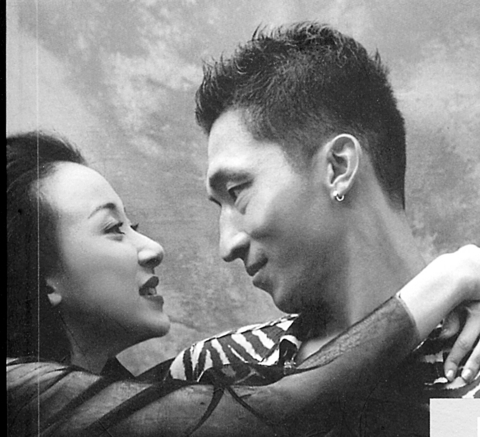In Taipei, where designer brands such as LV and Gucci are worshipped by the rich and middle class alike, fashion-wired ladies sporting dazzling dresses and premium accessories are all just par for the course at parties and trendy night-life venues these days.
And the city's stock of luxurious wares just got a little bigger with the recent addition of Taiwanese designer Kenji Du's (
Du's creations recall the shoe brand Manolo Blahnik, which achieved worldwide fame on the heels -- literally -- of Sarah Jessica Parker's character Carrie in the US hit TV series Sex and the City. Du's swanky and oh-so sexy high-heels of red, black and metallic-hued velvet are offset by encrusted diamonds and colored gems. The clientele for such footware are none other than the swelling ranks of modern, monied women not afraid of embracing their femininity, and who obviously enjoy being the center of attention.

Some may wonder just how high a girl has to prop up her heels to garner all that extra attention. Du's high-heels look high enough to break the wearer's ankles, but -- like those of the Manolo Blahnik -- Du's creations are said to be both fashionable and practical. "I have walked in his shoes for hours already, and my feet don't feel sore at all," a girl sporting Du's shoes attested at the opening party for his new establishment.
A good friend of the age-resistant star Stephanie Hsiao (
"I worked as a model and a dancer and sold clothes as a street-side vendor. It wasn't until 10 years ago that I was determined to become a fashion designer," Du said.

PHOTOS COURTESY OF KENJI DU
The 40-year-old designer's first encounter with fashion was at an award ceremony for new local designers held by the Taiwan Textile Federation (
Several years passed as Du's modeling job took off and gave him a life of comfort. He put his fashion designer dream on hold until he began pushing 30 and was reminded of the vow he had made to himself. With only an elementary school education, Du had to start from the bottom. "I began from the basics. It was really difficult for me since most designers didn't want to take on a 30-year-old assistant," Du said.
After a series of frustrations and setbacks, Du finally landed an apprenticeship at a local designer's studio and before long, he attended the textile federation's award ceremony again -- this time, as an award-receiver.
A couple years ago, Du set out to establish his own brand -- Kenji -- armed with a small loan of NT$300,000.
And like his shoes, his distinctive outfits have sexy written all over them. For his spring/summer collection, elegantly cut dresses and mini-skirts of bright shaded chiffon and lace offset by colored sequins draw out a feminine sweetness from the wearer's curves and lines. "I believe in simple cutting because I think over-accessorizing covers up a woman's natural contours," Du said. "For me, being sexy doesn't mean exposing lots of cleavage, navel and leg. Women can wear suits and still be sexy."
Turning away from mass production, Du chooses to present his creations as hand-made haute couture that can fetch high prices -- NT$40,000 for an evening dress, for example. His shoes' price tags are relatively low, fetching between NT$5,000 to NT$15,000. Another line of more casual footwear for young women is also on its way to the market.
Beside samples of haute couture dresses and high-heels, visitors at Du's boutique at the newly opened ATT Qui on Zhongxiao East Road can also check out the colorful handmade handbags from Ipa-Nima, the fast-rising handbag and accessory brand adored by Hollywood stars and models, and whose celebrity clients include former US first lady Senator Hillary Clinton and Asian diva Faye Wang (王菲).
Created by Hong Kong-born, Vietnam-based designer Christina Yu, who has graced the pages of Vogue and Asiaweek, Ipa-Nima's exotic creations are funky, boldly fusing colors and fabrics. Yu splashes sea blue, spring green, canary yellow, and gold and silver together on leather, hand-woven silk, cotton, and linen. Such a fusion screams fun, and satisfies women's desire to be fashionably different without going overboard. For women seeking a more dressy look, there are a series of small party handbags with sequins and gems, while cotton and canvas bags boasting floral patterns are good for work environments.
What's more, uniqueness in the form of Ipa-Nima access-ories won't cost you an arm and a leg. Imagine that -- walking out of a boutique with not only a one-of-a-kind look, but just enough spare change to get you home on the MRT to boot.

Google unveiled an artificial intelligence tool Wednesday that its scientists said would help unravel the mysteries of the human genome — and could one day lead to new treatments for diseases. The deep learning model AlphaGenome was hailed by outside researchers as a “breakthrough” that would let scientists study and even simulate the roots of difficult-to-treat genetic diseases. While the first complete map of the human genome in 2003 “gave us the book of life, reading it remained a challenge,” Pushmeet Kohli, vice president of research at Google DeepMind, told journalists. “We have the text,” he said, which is a sequence of

On a harsh winter afternoon last month, 2,000 protesters marched and chanted slogans such as “CCP out” and “Korea for Koreans” in Seoul’s popular Gangnam District. Participants — mostly students — wore caps printed with the Chinese characters for “exterminate communism” (滅共) and held banners reading “Heaven will destroy the Chinese Communist Party” (天滅中共). During the march, Park Jun-young, the leader of the protest organizer “Free University,” a conservative youth movement, who was on a hunger strike, collapsed after delivering a speech in sub-zero temperatures and was later hospitalized. Several protesters shaved their heads at the end of the demonstration. A

Every now and then, even hardcore hikers like to sleep in, leave the heavy gear at home and just enjoy a relaxed half-day stroll in the mountains: no cold, no steep uphills, no pressure to walk a certain distance in a day. In the winter, the mild climate and lower elevations of the forests in Taiwan’s far south offer a number of easy escapes like this. A prime example is the river above Mudan Reservoir (牡丹水庫): with shallow water, gentle current, abundant wildlife and a complete lack of tourists, this walk is accessible to nearly everyone but still feels quite remote.

In August of 1949 American journalist Darrell Berrigan toured occupied Formosa and on Aug. 13 published “Should We Grab Formosa?” in the Saturday Evening Post. Berrigan, cataloguing the numerous horrors of corruption and looting the occupying Republic of China (ROC) was inflicting on the locals, advocated outright annexation of Taiwan by the US. He contended the islanders would welcome that. Berrigan also observed that the islanders were planning another revolt, and wrote of their “island nationalism.” The US position on Taiwan was well known there, and islanders, he said, had told him of US official statements that Taiwan had not